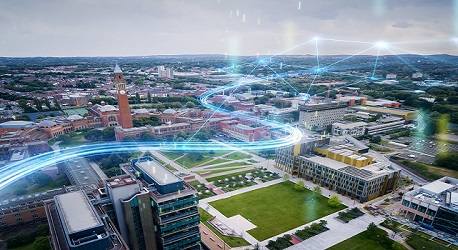
Views: 6
– The strategic partnership between the University of Birmingham and Siemens is focused on collaboration in areas such as smart infrastructure, mobility, energy and healthcare.
Minapim by Hernan Valenzuela: The University of Birmingham, in partnership with Siemens, initiated an smart university campus, which combines digital sensors and analytical technologies, artificial intelligence, decentralized energy generation and storage, renewable energy and concepts that help change the behavior of users.
The Edgbaston and Dubai campuses are expected to be the smartest in the world, creating a ‘Living Laboratory’ where research, teaching and learning benefit from access to new data and connectivity.
How will the Living Lab work
The focus of the ‘Living Lab’ is to capture data from the University’s building technologies, real estate infrastructure and power plants and use it for innovation, R&D activities as well as teaching. Examining energy demand and production with live data from all locations provides a unique opportunity for applied learning for students and creates a platform for cutting-edge research.
Innovation through strategic partnerships
The partnership is designed to encourage innovation and collaboration at all levels, the important part of Siemens will be to fund a team with doctoral scholarships at the university based in the United Kingdom and in Dubai. Its research projects will be to create jointly by Siemens and the University to address important challenges in data, technology, urban systems and the NetZero objective.
In the year 2021, the University of Birmingham will become the first university in the world to launch the Internet of Things (IoT) technology at scale. Starting in the fall of 2021, the first phase of this major energy efficiency project will include the deployment of 23,000 IoT Enlighted sensors across the University property.
“As one of the UK’s largest universities – with a global community of over 38,000 students – the university is already a prosumer (producer/consumer) of energy and these technologies will be further optimized in the system we are working on together,” said, Matthias Rebellius, member of the board of directors of Siemens AG and CEO of Smart Infrastructure.
“Partnerships like this are extremely important for gathering new insights, testing and developing new technologies and creating an efficient and sustainable energy infrastructure. The university campus in Dubai will be a global example of sustainability at the re-scheduled Dubai Expo 2020”.
Professor Tim Jones, Dean and Deputy Director of the University of Birmingham, explains the university’s ambitious vision: “Our aim is to deliver the smart university campus using cutting-edge technologies in Edgbaston and Dubai. In this way they will be the smartest globally. This will enhance our student experience, create new opportunities for research and innovation, while significantly reducing our carbon footprint.
As we approach COP26 in Glasgow this fall, it’s clear we’re in the “decade of delivery” for NetZero’s goals. Strategic university-industry partnerships, such as ours with Siemens, are important to help identify ways to turn goals into reality”.
“We are excited to be working with the University of Birmingham on this project and are confident that together we can develop a clear path for the University to become a smart and liquid zero campus. Our goal is to apply the University’s strategic vision on its campus.” Said, Carl Ennis, CEO of Siemens, GB & Ireland.
“We will find out where carbon savings are possible by managing resources more efficiently, in a system that is adaptable to changes in demand. All of this can be achieved with a combination of connected digital technologies, artificial intelligence, decentralized energy generation and storage, renewable energy and ideas that help change user behavior”.
As part of the partnership for the smart university campus, Siemens will provide a 10-year bureau for energy and IoT services to ensure the university harnesses the full potential of the industry’s technology and expertise.
The University has already made significant progress in making its operations more sustainable, including a 2020 target of reducing carbon emissions by 20%, and is constantly looking to improve the environmental performance of its buildings, including a reduction of 2,856 tCO2 annually, equivalent to 5 % of current University emissions.
University of Birmingham and the UN Global Compact
It is very important to remember that, earlier this year, the University of Birmingham signed the United Nations Global Agreement – the world’s largest corporate responsibility initiative – as part of its commitment to reducing its environmental footprint and maximize the impact of your research. The University of Birmingham also participates in the COP26 University Network and will be present at the COP26 conference in Glasgow in November.
Sources: Siemens University of Birmingham
Related article: At the bottom of Mt. Fuji Toyota will build city of the future
Leave a Reply